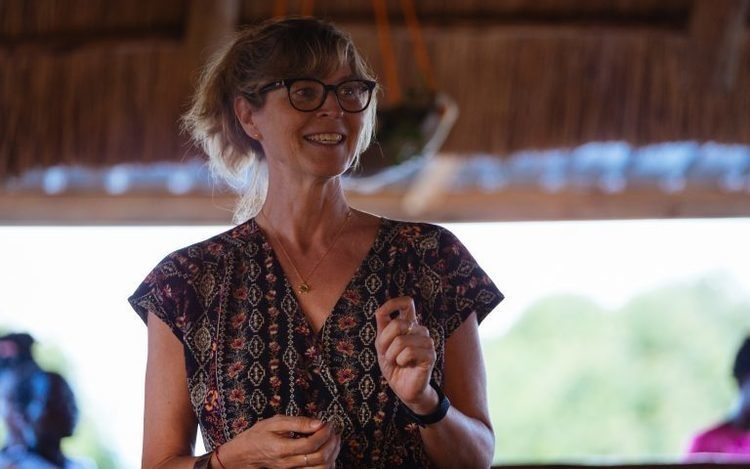Un/Knowing War: Understanding Shared Experiences with Erin Baines
Susan Thomson, Associate Professor of Peace and Conflict Studies and Director of the Women’s Studies Program, organized a lecture with Erin Baines on the shared experience of war on April 8. Baines, Associate Professor in the School of Public Policy and Global Affairs at the University of British Columbia, studies the impact of war in communities and how we interpret the idea of “shared experiences” surrounding the context of violent conflicts. During the lecture, Baines presented on her work in Uganda, a central African country torn apart by civil war for decades which reached its height in the early 2000s.
Before starting the presentation, Baines asked the group, composed of students and professors alike, a series of questions to ponder throughout her talk: “From whom do you know war? What is the role of stories in coming to know war? Do you want to also share a story of war that gives you pause, that haunts you or that teaches you about war as a social process? What do you do with this gift?” As citizens of Western cities, Baines pointed out how we tend to associate war and shared conflict with faraway places, yet conflict throughout history has happened in our backyard, which she said is vital to acknowledge.
Baines then gave background information about the war in Uganda, a war that international organizations often refer to as a forgotten war, due to lack of press in global media and difficulties surrounding the war’s ethics on either side. The war started in 1987 and officially ended in 2008 after brutal fighting in the early 2000s from the Lord’s Resistance Army (LRA) led by Joseph Kony, a terrorist militia that continues to fight governments in other central African countries such as South Sudan. Baines began her work in Uganda in 2003 after it was revealed that the militia had begun abducting children to serve as child soldiers or to force into marriage. The UN failed to address the conflicts as they escalated initially, so Baines used her research to partner with human rights organizations in Uganda to help women and children recover from their trauma. At the same time, she works to understand the shared experiences of the war.
In 2004, a group of researchers and activists for Uganda, including Baines, traveled to the UN Headquarters in New York to advocate for peace and intervention from the UN and amnesty, especially surrounding the LRA’s abductions. Angelina Atyam, whose daughter Charlotte had been abducted by the militant army and forced into marriage as a child bride, joined Baines in her activism. Charlotte eventually escaped with her two sons, yet suffered from survivor’s guilt and a blurred sense of justice from the community since she was married to an LRA general. The conflict in Uganda brought about essential questions surrounding the ethics of war and peace, as many soldiers in the LRA were child soldiers forced into fighting without understanding the reasoning behind the war.
In 2006, the UN instigated the first set of peace talks. However, peace advocates knew very little about the people affected by the war, which troubled Baines and sparked her interest in exploring the shared trauma of war. As Uganda grapples with the end of the war and the country’s shared trauma, Baines has photographed various people impacted by the war. She shared many powerful photos used for her research and talked about how she helped co-write a book with a girl named Evelyn Amony, a child bride and survivor of the LRA abductions. In her biography, Amony included a story of how she was whipped unconscious by a boy who felt guilt and helped her the following day. The story brings up important questions about ethics and how children were manipulated by army leaders.
Baines continued her presentation, discussing the role of gender in the Ugandan war and its aftermath and how the abducted children were influenced by blurred gender roles. Baines continues to work in Uganda, asking former victims and LRA members important questions about their involvement and shared trauma in the war. She hopes to advocate for the victims and bring attention to the complicated conflicts happening in Central African countries.









